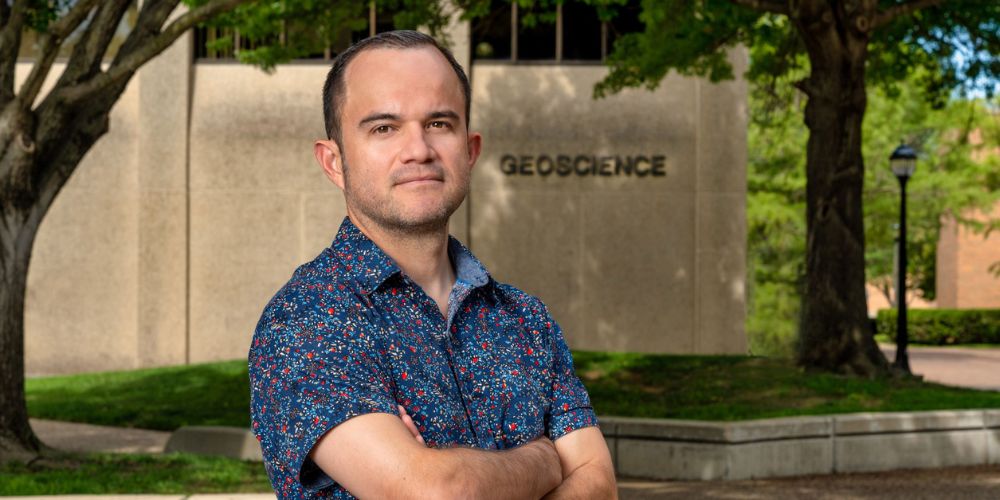UTA scientist developing drinking water evaluation tool

A University of Texas at Arlington researcher is leading a federally funded study aimed at improving the ability of water suppliers to ensure drinking water is safe and reliable under extreme weather events. Ricardo Sánchez-Murillo, associate professor of earth and environmental sciences, received a $399,799, two-year grant from the U.S. Department of the Interior to develop a tracer tool to allow water suppliers to better manage drinking water in north Texas.
“The main goal of this project is to implement a tracer tool within the Tarrant Regional Water District (TRWD) of north-central Texas to better enable those in charge of the water supply to ensure the security and reliability of the region’s drinking water during droughts, flooding, and other extreme weather events,” Dr. Sánchez-Murillo said. TRWD is the organization responsible for providing a reliable and sustainable water supply, flood protection, and programs to promote environmental sustainability in Tarrant County and the surrounding region.
Tracers are substances which can be detected in water at very low concentrations, allowing researchers to follow—or trace—the flow of water. The ability to trace the flow of water is crucial to understanding the complex processes in hydrological systems.
Meteorological events such as persistent droughts and extreme storms, combined with an increasing demand for water caused by steady growth in population, are creating the need for Texas to reevaluate its water plans. Between 2012-22, Texas’ population grew by nearly 4 million people, by far the most of any state in the United States.
“There is a great need to understand more about water flow and distribution in the region in light of extreme weather phenomena and a growing population,” said Arne Winguth, professor and chair of the Department of Earth and Environmental Sciences. “By providing better information about how these factors affect the water supply, Dr. Sánchez-Murillo’s research will help administrators to better manage water resources.”
Sánchez-Murillo noted that there is a pressing need to quantify three things: 1) blending ratios from drinking water reservoirs, 2) the arrival time of such water blends to drinking water treatment plants, and 3) the incursion and persistence time of recycled stormwater in the tap water distribution system after large convective rainfall events.
Blending ratios involve the mixing of different water sources for drinking water supply. Quantifying blending ratios and their evolution throughout the water distribution system is necessary for assessing drinking water operations and treatments, Sánchez-Murillo said.
“However, this calculation has been challenging,” he said. “In this project, we aim to introduce a novel methodology based on water stable isotopes to resolve this fundamental issue.”
Creation of a monitoring method will enable water managers to improve strategies for treating drinking water and better understand the effects of large rainfall events on the urban water cycle and the potential transport of contaminants into the water distribution system, he added.
“Elucidation of emerging patterns in time and space will advance the understanding of water movement and mixing and the tap water supply systems’ reliability and vulnerability in light of inter-annual climate variability,” he said.
Sánchez-Murillo believes that the tracer tool developed in this study could be used in other urban settings across the United States that also rely on surface water reservoirs for their drinking water supply.
About The University of Texas at Arlington (UTA)
Located in the heart of the Dallas-Fort Worth Metroplex, The University of Texas at Arlington is a comprehensive teaching, research, and public service institution dedicated to the advancement of knowledge through scholarship and creative work. With an enrollment of approximately 41,000 students, UT Arlington is the second-largest institution in the UT System. UTA’s combination of outstanding academics and innovative research contributes to its designation as a Carnegie R-1 “Very High Research Activity” institution, a significant milestone of excellence. The University is designated as a Hispanic Serving-Institution and an Asian American Native American Pacific Islander-Serving Institution by the U.S. Department of Education and has earned the Seal of Excelencia for its commitment to accelerating Latino student success. The University ranks as the No. 1 national public university in the U.S. for veterans (Military Times, 2024), No. 4 in Texas for advancing social mobility (U.S. News & World Report, 2025), and No. 6 in the United States for its undergraduate ethnic diversity (U.S. News & World Report,2025). UT Arlington’s approximately 270,000 alumni occupy leadership positions at many of the 21 Fortune 500 companies headquartered in North Texas and contribute to the University’s $28.8 billion annual economic impact on Texas.